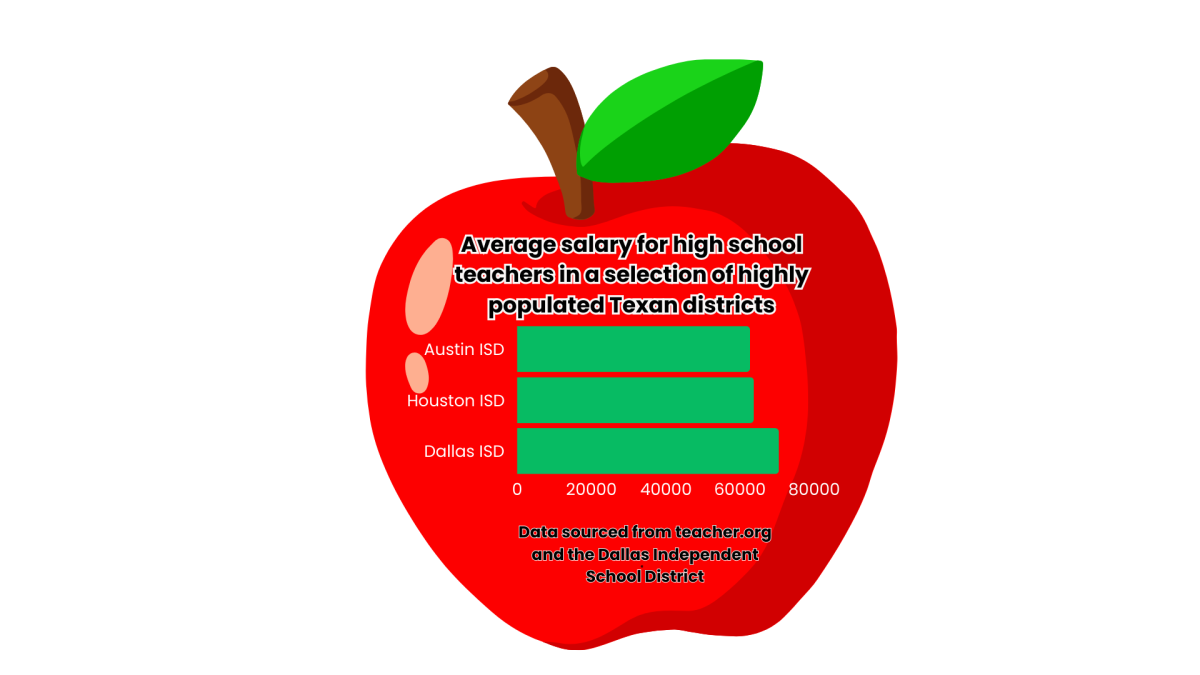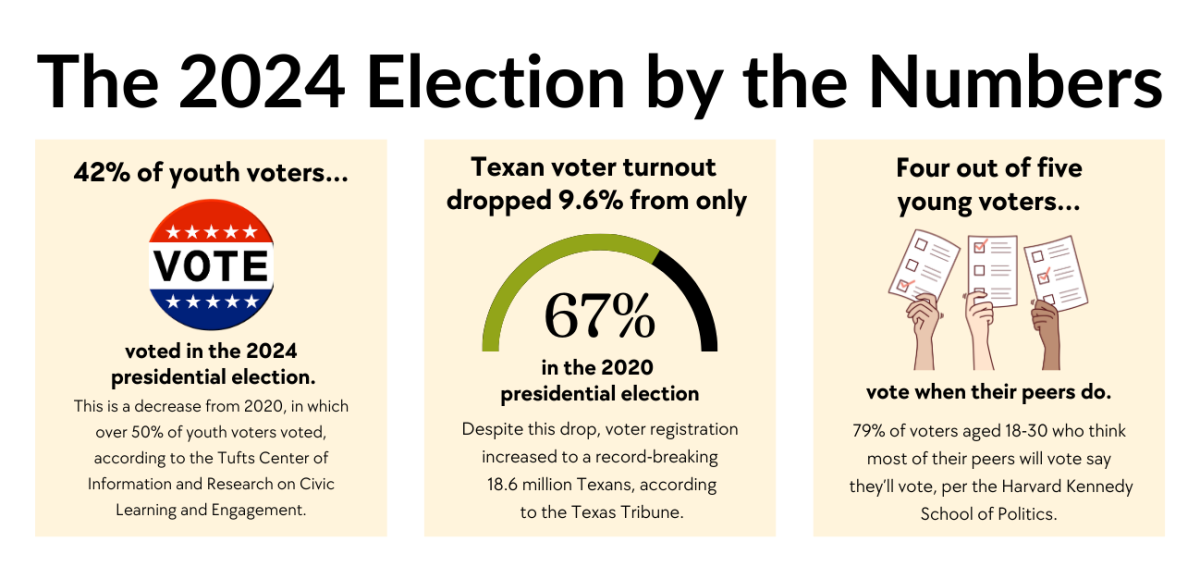On March 4, 1893, Grover Cleveland became the first U.S. president to serve two nonconsecutive terms in the White House. It’s 131 years later, and America finds itself in the same predicament for only the second time, voting for the criminal racist instead of a mustachioed one.
I’m not here to talk about president-elect Donald Trump, however; to be completely honest, I don’t want to. There is not a pebble left in the man’s life that has gone unturned. The “here’s-why-Donald-Trump-is-bad” argument isn’t just pointless at this stage, it’s partly why the Democrats lost.
Of course Trump is going to kiss up to Putin. Of course he’s going to roll back climate legislation and do myriad other things to repay his circle of corporate good old boys and bootlickers. People are surprised his cabinet is shaping up to be America’s Most Wanted. This is Donald “Fifth Avenue” Trump; to put it bluntly, what else did you expect?
Among our many current misfortunes is that it no longer matters what most of us think about the president-elect. The race is over and, like it or not, Trump got the job. To sit here and palaver about the outcome would be a waste of everyone’s time.
“After all, sometimes the other team just plays a better game.”
That’s what I’d say about the whole ordeal and be done with it, were it remotely true.
But Donald Trump did not play a better game. He instead ran what could have been aptly described as the ugliest campaign in decades, if not longer. He fumbled his way through an initial debate against Joe Biden, who, fortunately for the former president, put on so miserable a display that it managed to frame Trump, who’s proven to have grown more senile in his own right, as the more competent of the two.
And need I remind you of his rhetoric? Xenophobia, conspiracy and corruption ran abound at the former president’s rallies, although “stand-up comedy routine” may be a better descriptor. Riddled with bizarre comments manifesting Hannibal Lecter, remarks on the supposed grandeur of Arnold Palmer’s male anatomy and countless other fables distantly removed from the projected policies of his administration, Trump’s rallies gained infamy online for their antics. Those times he seldom took to speak on those plans proved to be darker still: stumbling through trite anecdotes and empty promises like a drunkard, the soon-to-be-president provided a glimpse of the grim leadership we can expect to return for the next four years.
Still, you no doubt already knew this; Trump’s campaign was mocked, mangled and mocked again by nearly every corner of the mainstream media. The man practically pays the bills of the networks’ late-night hosts. I’m no psephologist, but it all appears to point to a single conclusion: this should’ve been impossible to lose.
But lose, the Democrats did; control of the nation was wrestled from not just the vice president, but the entire party on Nov. 5, in what could only be described as the biggest humiliation ritual in recent history. Many who voted blue are no doubt still reeling from such an absolute defeat. To their credit, every expert swore that this race would be historically close, only to be crushingly disproven in a matter of hours. Trump’s standout feat as a Republican, almost winning the popular vote and becoming the first Republican presidential election victor to do since post-9/11 Bush did so in 2004. Safe to say, my previous statement ought to be pursued by another:
“You can win a bad game…so long as your opponent plays worse.”
After careful observation of both sides this year, this is the takeaway I’ve come to; Trump and the Republican Party didn’t so much win this race as the Democrats lost it.
Numerous pundits appear to have arrived at the same conclusion, though this is where it gets interesting: none of them can seem to agree on the reasons for the Democrats’ failure.
Were they too “woke?” Not “woke” enough? Did Joe Biden drop out too late, or should he have stayed in? Did they fearmonger too much? Did Kamala Harris not get enough PR, or was it simply the wrong kind? Was Israel an issue? Did they abandon the working class? How would things have gone if they’d gotten just one more celebrity endorsement?
This clash among media moguls in the weeks following the election is, in many ways, endemic of the root cause of the party’s woes:
Does anyone even know what the Democratic Party stands for?
In the struggle for ideological supremacy, it would appear that many of these arguments fail to realize that they are, to some degree, all valid factors, the individual puzzle pieces that together form the portrait of Democratic defeat.
The Democrats were indeed “too woke,” at least in the mutilated, modern sense of the term, still emphasizing performative and socially rejected nomenclature such as “Latinx” that ultimately alienated their respective communities. This comes off especially insincere as their immigration stances have grown to resemble those of the right wing. Such theatrics must have been quite groundbreaking in, say 2016, when Southern immigration was still a novel, nebulous concept and legalized gay marriage, blisteringly recent. It’s been eight long years since then, and our world has become unfamiliar to that time. In the stretching memory of a political party, though, perhaps they’ve mistakenly overlooked these changes.
Were the Democrats truly “woke,” understanding and executing beneficial legislation to minority communities, perhaps their turnout would’ve been more favorable. Nevertheless, they’ve proven that even when in near-total power, their complacency continually lets these groups down (see California’s decades-long botch of the homeless crisis, Obama’s failure to bring attention to Black interests while in office, etc.).
As for Kamala Harris’ ascension and campaign, I’ll generously concede that the party didn’t have a good option when it came to dealing with the president’s increasing senility. There was a persistent unease regarding Biden’s age prior to that first debate, but it’s true harm would only be realized afterward, leading to the very obtrusive scramble within the party this summer. Democrats were pressured to select a new candidate without a primary, only to discover the next-best person for the job hadn’t the branding nor the history of the president, albeit none of the controversy either. Despite an impressive PR and fundraising push, selecting a relative unknown over the man with at least something of a chance proved disastrous. It’s obvious now why such a move had never been attempted before; it’s doubtful that it ever will be again.
Perhaps most culpable of all, though, has been the alarmism. Among their many catchphrases and buzzwords, the party’s unmistakable favorite over the past election cycle has been the admonition that “democracy is at stake.” Of course, with the uncertainty that Trump presents, it was never untrue, per se. And yet, historical precedent notwithstanding, it began to ring hollow as Nov. 5 drew closer. I began to get the sinking feeling that was all they had to say.
With hindsight on my side, it would appear as though it was. Herein lies the most compromising reality of the modern Democrats: they don’t need to say anything else. So long as the Republicans are just a bit worse, they can effectively get away with holding the nation’s progressives at ransom. It’s how Harris experienced such an outpour of support before even announcing her policy platform, or how she was able to shut down pro-Palestine supporters with an imperious “I am speaking,” followed by the emboldened cries of a thousand never-Trumpers.
Trump, to the Democratic Party, is the key to success. Just as the Republicans play on their supporters’ fear of foreigners and identity politics, so too do liberal politicians understand the fear the Trump name evokes. Not only that, but he can distract the left from its true interests the same as the right. Remember at the start of this story, when I said I didn’t want to talk about Trump? I spent the next seven paragraphs doing exactly that. I’d like to say that was by design; truthfully, it only serves to show the dangers the former president poses as not only a political weapon, but an informational one. As long as he persists, the Democrats need not speak of anything else.
This air of indecision pervades not only Democratic ideology, though. You could fill an abyss with the wrongdoings and red flags of the Republican Party, but you’ve got to give them credit for one thing: they know their target audience. The Republican base is well-established; generally an older, whiter, more rural, less educated, most likely religious crowd. If I asked you to picture someone who votes red, several caricatures no doubt come to mind immediately.
The Democrats have historically attempted to appeal to practically everyone not involved directly with the far right. That’s a lot of people. While it’s not inherently a bad idea to garner as much overall support as possible, that lack of focus leads to no particular attention being paid to any specific group. This year alone, Democrats put efforts into flipping Hispanic, Black, Christian and even Republican voters (looking at you, Liz Cheney town hall). It’s difficult for one party, let alone one candidate, to stretch themselves so thin for the sake of a few new supporters. It’s especially difficult when the people you flipped last time turn out to be a bunch of flakers.
Compare this year’s Trump to 2020’s Biden and the president-elect loses big. About 4 million votes big, to be specific. An admittedly impressive gain of 3 million votes for Trump when compared to his last run barely tickles Biden’s inconceivable 81 million. Trump’s increase in support, no matter how confounding, doesn’t evoke near the levels of confusion as the loss of some 7 million blue voters.
Some will cite racism, or better yet sexism, as the culprits; as straightforward as that may be, an absence of such volume couldn’t possibly be attributed to a single reason. Dumb voters, then? Yes, but dumb voters are part of the game. The reason for the implosion of the party’s election efforts this year could be thanks to the same reasons for the media’s contradicting speculations: nobody believes in the Democratic Party, including its members.
It explains all the walking back on positions, the party realignment, the general lack of confidence in the loyalty of any given demographic: it’s not that the Democrats believe the wrong things, or even the right things. They don’t believe in anything.
How else could a party support fracking, and yet claim to have environmental interests? How else could a party defend immigration restrictions, only to champion cultural integration? In what world does a party distance itself from transgender discussion, then claim to be an ally?
For decades, Republicans have molded their organization into a bastion of Judeo-Christian conservatism and softcore libertarianism. The Democrats, insecure of a consistent and singular platform, have instead buckled under the overbearing idea of being everything else. This year, easily subjugated by the half-wit schemes of a reviled criminal, they’ve proven everything else isn’t an ideology, and whatever it is, they can’t be it.
How, then, do we reconcile this? A truly competitive third party is a delusion, and yet with the anticipated departure of Biden and the inevitable decline of Nancy Pelosi and Bernie Sanders, we may be poised for a leaderless Democratic Party in the near future.
Well, fortunately for the status quo, it’s unlikely we’ll have to reconcile much of anything. If pendulum-swing voting holds true, and it always does, then we can expect the Republican legislature to grow just unpopular enough over the next two years to leave moderates scrambling for any alternative. In this way, the party-of-everything-else will live on. The ouroboros of American cretinism will continue to swallow itself until the Earth goes cold.
What else is there, after all, for we who can’t afford to reject them? God forbid a Republican get elected; they’re just bad enough to keep us voting.
You can lose an election in a million ways. Tell everyone you’re necessary, and you can lose a million times.















Henry Holmes • Dec 19, 2024 at 11:23 pm
Hello Mac J and Noah Braun,
Even though this is an opinion piece, there are objective issues within this article that require addressing. Your points on democratic identity, political theatre, and the party stretching too thin are great ideas to look into and I have enjoyed a lot of what Mac J has covered in the past. However, this article reflects Mac J’s disappointing history in dealing with both local and national political topics. The most immediate problem to me is the dismissal and self inflicted ignorance on minority issues and the problems facing America’s most impoverished. In spite of the fact that elections are increasingly being defined by the minority vote, your greatest mention of this group exists in the shortest analytical paragraph. In spite of the fact that the Hispanic vote shifted 14, 15, and 12 points to the right, in Texas, Pennsylvania, and Florida respectively, (just to name a few examples), your greatest mention of this group exists in a paragraph derivative of your discussion on “wokeness”. On top of this, your association of “Hispanic, Black, Christian and even Republican voters” with the word “flakers” is a truly terrible look. Completely dismissing these groups of people is an incredible disservice and leaves the story incomplete. It also seems improper to completely overlook the issue on the economy when 68% of democrats and 93% of republicans considered it to be their top issue going into the election. While inflation did cool off after 2022 many people still felt its lasting impact on their wallets. Not only were the needs of these people not properly addressed by both parties, the same is true for this article. Coupled with attributing a part of the “game” to “dumb voters”, it comes off as incredibly elitist and ignorant. Furthermore, in an effort to sound smart, you use a slur to describe the “ouroboros of American” politics. You yourself fall into what you described as hypocritical wokeness when you use a derogatory term for a severely marginalized group of people with a debilitating mental and physical impairment. Finally, you leave us with nowhere to go in the future. You continue the “ouroboros” by presenting no solution. This article merely serves to point the finger, offer nothing in return, and leave the reader in a void of despair. You make it clear there is no reason to hope for anything better than the swing of the pendulum.
I hope Mac J can continue to look inwards and improve for the future.
Best wishes,
Henry Holmes